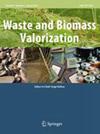地衣芽孢杆菌发酵法将马来西亚鱼肠(Keropok Lekor)副产品转化为生物活性鱼蛋白水解物:副产品特征对营养、抗氧化和抗菌能力的影响
IF 2.6
4区 环境科学与生态学
Q3 ENVIRONMENTAL SCIENCES
引用次数: 0
摘要
本文章由计算机程序翻译,如有差异,请以英文原文为准。
Valorization of Malaysian Fish Sausage (Keropok Lekor) By-Products into Bioactive Fish Protein Hydrolysate by Bacillus licheniformis Fermentation: Influence of By-Products Characteristics on Nutritional, Antioxidant, and Antibacterial Capacities
求助全文
通过发布文献求助,成功后即可免费获取论文全文。
去求助
来源期刊

Waste and Biomass Valorization
ENVIRONMENTAL SCIENCES-
CiteScore
7.90
自引率
3.10%
发文量
311
审稿时长
4 months
期刊介绍:
Until the 1990s, technology was the main driver when dealing with waste and residues, the objective being the treatment of waste for (landfill) disposal, storage, and in some cases sorting. In the 1990s, depletion of raw materials and socio-economical concerns supported the direct recycling of waste and residues. However, the direct recycling approach is limited when waste/residues contain significant amounts of pollutants such as heavy metals and organics (VOC, PAH), and when the treatment process to remove/stabilize or destruct the pollutant generates emissions. Due to depletion of natural resources, increasing greenhouse emissions, and awareness of the need for sustainable development in terms of safely reusing waste and biomass, the transformation of waste/biomass to valuable materials and energy (i.e. valorization) is emerging as a strong trend
 求助内容:
求助内容: 应助结果提醒方式:
应助结果提醒方式:


